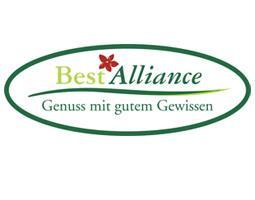
German retail operator Rewe Group and crop protection specialist BASF have announced plans to extend sustainable production of certain fruit and vegetable varieties with the joint development of a sustainable procurement strategy under the Best Alliance brand.
Rewe, which operates Germany's second-largest food retail chain as well as a number of other supermarket and hypermarket banners across Europe, recently signed a new strategic sourcing partnership with leading fresh produce company Univeg Group aimed at developing contract farming projects in order to secure stable and sustainable volumes of fresh fruit and vegetables for sale through the retailer.
Best Alliance is aimed at expanding on pilot projects set up during the past couple of years in Spain and Italy, where Rewe Group and Univeg have already established contract farming of strawberries, peppers and table grapes.
The scheme is based on close cooperation with partners from agriculture, service providers, manufacturers of crop protection active ingredients and agricultural advisory services as well as with non-governmental organisations as independent competence partners.
According to the project's partners, this is a direct response to the challenge of increasing competition for supply of agricultural products in the context of growing global demand.
'Consumers are increasingly inquiring about the ecological and social conditions under which their food is produced,' said a spokesman for BASF. 'Moreover, the focus is no longer on the quality alone. The availability of high quality food is also assuming greater importance. There is a trend to the more sustainable production of food, particularly in the case of fresh fruit and vegetables.'
BASF Crop Protection is already a partner in the Best Alliance initiative, but the decision to jointly develop a concept for the sustainable production of selected fruit and vegetable varieties represents an important new step in the project's history.
Fruit and vegetables sold under the Best Alliance brand must meet criteria relating to the optimised use of crop protection active ingredients, as well as adhering to defined environmental and social standards.
'For a product to be able to bear the Best Alliance brand in the long term, it is essential that there is continuous improvement in all three fields,' the spokesman added.
BASF is now carrying out investigations to determine how eco-efficiency analysis can be used in future as a central control tool for Best Alliance products, with improvements contributing to the overall sustainability and vertical integration of Rewe’s procurement chains for fruit and vegetables.
'A clear commitment to sustainable production within the Best Alliance brand is an important and consistent step for Rewe,' commented Guido Siebenmorgen, head of strategic food buying at the REWE Group. 'It is crucial to implement more comprehensible criteria in the sense of ecological and social responsibility.'
Methods developed by BASF and certified by the German Technical Inspection Organisation assess the economic and ecological effects of sourcing over the whole life cycle, identifying the crucial variables which can improve a product’s sustainability along the value chain.
In this way, all participants in the procurement chain are involved in the improvement process, and similar products or processes can be compared using the eco-efficiency analysis. 'Only if all the influences are taken into account in their entirety, can the best balance be found between the requirements of industry, society and the environment”, said Klaus Welsch, vice-president of BASF’s Crop Protection business in Europe.



